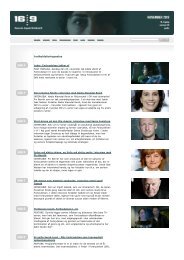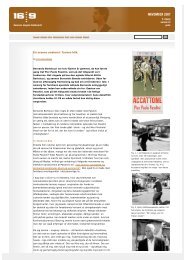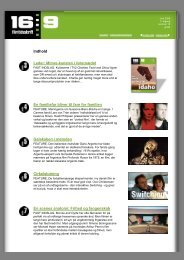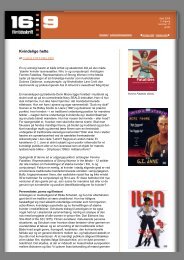Create successful ePaper yourself
Turn your PDF publications into a flip-book with our unique Google optimized e-Paper software.
eyond any real time and space.We should ask ourselves what is performed by Joan Fontaine in herdelivery of the narration. She is not enacting the composition of t<strong>hele</strong>tter; she does not pause or correct herself in the effort to find the rightwords. Although she suggests at the start that she may be dying hervoice is not fevered or enfeebled. The film does without one of StefanZweig's key literary effects, the adoption of a stilted manner thatdisplays the woman's straining after the weight and depth that shewants her words to attain. In Zweig's tale the letter opens with a bluntstatement of the death of the writer's child. Then the fact of it isobsessively restated so that the whole account is governed by onemood of heartbreak at the edge of hysteria. But in the film both thenarration and the performance vary their tone in response to the eventsimmediately under description. The moods of the words and of thevoice carry the sense that Lisa is speaking to Stefan, reliving thefeelings and thoughts of the moments as she retraces them. The fictionis almost of Lisa's seeing the past now as Stefan reads about it, andoffering her response to its sights and statements - responding now, forinstance, to Mme Spitzer's description . So the impression of presence,of an impossible presence, is reinforced.The effect is reversed in Stefan's reading of the letter. At its completionhis mute servant John (Art Smith) does him the service of writing downthe name of Lisa Berndl. He responds to this as if to new information.Yet the name has been extensively used throughout the flashbacks. Itcould hardly be otherwise, one might think [*3]. But here too Letter froman Unknown Woman aggravates a difficulty that other films wouldavoid. The first word spoken within the first flashback is Lisa's name. Itis not spoken but shouted, three times, as Lisa's mother summons herindoors from her dreamy contemplation of the delivery van with Stefan's'beautiful things'. Thereafter the name is frequently used, often withperemptory emphasis to command Lisa's movement, notably right atthe start of three of the four major flashback sequences; in closejuxtaposition, then, with Stefan's reading image [*4]. It should at leasttrouble us to find Stefan at the end still without the knowledge of Lisa'sname that we seem to have obtained through his reading.We could understand the intention coherently as a design to maintainthe subjectivity of the narrative in the letter's text (where Lisa is only -like the heroine in Rebecca - a nameless "I") and to stress theindependence of the much broader perspective taken in the film'senactments: the film knows her name, though the letter does not tell it.Yet we must understand the drama of the flashbacks to be closelyderived from the letter's account; its shape is determined by Lisa'sexperience and we see nothing of Stefan's past life or career (forinstance in Milan or America or in the concert hall) that does notimmediately bear upon Lisa's story as Lisa has told it.It is, on the face of it, odder that the letter is unaddressed than that it isunsigned. Lisa was never going to reach the end of what she had to tellbecause she was never going, in the circumstances of her writing, toarrive at the one point that could satisfy her: Stefan's recognition. Soher writing would stop only as her strength failed, at the start of yetanother "If only..."At the opening there is no Dear Stefan to specify the you in "By thetime you read this letter I may be dead." There is a play with the nameshere whereby the writer has omitted Stefan's name and withheld herown, only for the film to have it shouted by her mother on the break asnarration yields to enactment in the flashback that takes us to Lisa'sgirlhood. On this day - which she speaks of as her birthday - Lisa'smother names her for us, performing the introduction that Lisaconsistently evades. One aspect of the deadlock between Lisa andStefan, reflecting their different orientations to time and memory andhope, is that Lisa is unwilling to sully the authenticity and spontaneity ofStefan's recognition by identifying herself while Stefan in his narcissismwants to hear his own name on Lisa's lips more than he wants to learnhers.
















